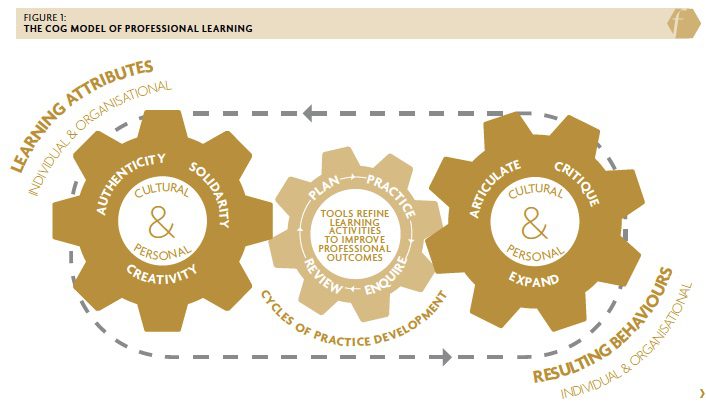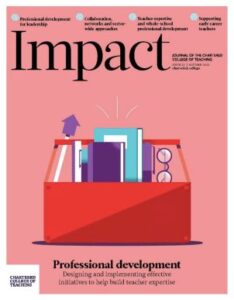Creating the engine room for professional learning: Explaining a research-based model

Teachers as learners
Teachers are also learners. They learn through their engagement with a knowledge base, through their immersion in practice contexts and through their relationships with others. Teachers’ learning determines how their practice develops over time and what impact their work has on students, colleagues and the settings in which they work. Working with a mentor, for example, might help an early career teacher to engage positively with real behaviour challenges by connecting training content, reading, gaining experience through trialling new approaches and reflecting on them with support. The mentor might use an observation framework to track changes in classroom practices and the teacher might use a reflective journal log to stimulate ongoing reflection.
A model of professional learning developed through abductive analysis
As a teacher educator and researcher, I have undertaken research related to teachers’ professional learning. This body of research led to a conceptual model of professional development. The model is now known as the CoG Model of Professional Learning (Figure 1). The development of the model is an example of abductive analysis, which is a ‘creative inferential process’ (Tavory and Timmermans, 2014, p. 5), and contrasts with deductive or inductive research methods. Three criteria inform the success of abductive analysis: fit of evidence to theoretical claims, plausibility of meaning-making through comparison with existing theories, and relevance to relevant communities (Timmermans and Tavory, 2012; Earl Rinehart, 2020). This article first introduces the model and then considers its ‘fit’, ‘plausibility’ and ‘relevance’, before considering the implications for the profession.
The abductive outcome: The CoG Model
At the heart of the CoG Model is professional learning activity such as mentoring, coaching, action research or Lesson Study. This activity could be used within initial teacher education or a CPD programme. It could be driven by school improvement or by performance management. Rather than a single training episode, such as attending a stand-alone inset session, the professional learning activity creates cycles of practice development taking place in the teachers’ professional context. These sorts of professional learning activities take time, so it is important to ask whether teachers are learning and developing or just increasingly busy. Having the right tools for the job can help to scaffold, frame and measure the teachers’ learning. Examples of such tools are video, observation frameworks and effective questions.
The CoG Model includes attributes held by individuals and organisations that fuel professional learning. These are creativity, solidarity and authenticity. Creativity refers to being given permission to problem-solve, opportunities to innovate and access to alternative practices and perspectives, enabling practitioners to gain the capacity to develop original thinking and the confidence to go beyond routine practices. Developing a sense of solidarity requires teachers and school leaders to engage in collaboration and joint enterprises with others and to see beyond their personal experiences and immediate concerns. Authenticity in professional learning is enabled by practitioners understanding the tensions and priorities of the educational setting in which they work and taking account of the ethical dimensions of their practice.
The CoG Model also defines valuable changes and behaviours resulting from professional learning. These changes continue to build individual and organisational capacity. As learners, it is essential that teachers are able to articulate their dilemmas and ideas and to share their achievements from practice development, ideally through both internal and external networks, but often starting in the one-to-one conversations with peers, coaches or mentors. They also need to invite critique to ensure that their ideas and evidence are reviewed with an informed perspective, as well as critiquing others’ work with a generous spirit. As the cycles of practice development and professional learning go hand in hand, teachers’ knowledge, professional repertoires and expertise expand, and this allows their settings to become more effective in creating successful education for all.
Fitting research evidence to the theoretical claims
The CoG Model was developed through creative inference underpinning the abductive process. This means that my immersion in research projects led me to theoretical insights through working iteratively with the evidence, the conceptual frameworks (the emerging model) and theories related to professional learning. Here, I focus on attributes and tools to exemplify the ‘fit’ between the research and the model.
The role of creativity was evident in research focusing on developing approaches to teaching thinking skills (metacognition). In this research, stages in teacher engagement in pedagogic innovation were identified, from initiation or induction, through developing questions from practice, with the final stage being an informed commitment to the approach, which becomes a substantial part of teaching repertoire (Leat et al., 2006). As there was no one right way to develop metacognitive teaching, it was necessary for teachers to experience opportunities for pedagogic creativity and innovation in order to make the transitions between the stages (which not all teachers made).
In the same research, it was evident that developing a sense of solidarity allowed teachers to understand others’ needs, to take responsibility for what mattered in the project and their schools, and to be part of a democracy of accountability, and to do so by engaging with their peers, their students and the wider community. Three phases towards teacher collaboration were recognised. Stage 1 was the ‘personal’. Teachers focused on their own understanding, rooted in developing classroom practice and analysing the data that emerged. They arrived at generalisations and perceived their relevance to their own teaching situations. Stage 2 was the ‘collegial’. Teachers started to act as a community in which research was designed, conducted and analysed, in an environment characterised by professional intimacy. Stage 3 was the ‘collective’. The collegial group worked with others in new settings, allowing the research evidence to be more commonly recognised and collectively explored across a wider range of contexts. From stage 1 onwards, there was evidence of solidarity, first with the learners and then also through the emergence of the collegial and collective professional networks.
The significance of authenticity was illustrated through evaluative research of interprofessional video-based coaching development, involving speech and language therapists working in coaching relationships with teachers in primary and Early Years (Lofthouse et al., 2018). The schools were situated in socially deprived wards and attended by high concentrations of children with speech, language and communication needs and by students from families for whom English was not their first language. The coaching mobilised the knowledge and skillsets of both teachers and speech and language therapists to better enable the teachers to critically reflect on and enrich their pedagogic practices. Rather than an off-the-peg approach to training, the coaching formed more nuanced cycles of practice development, situated intimately in the realities of school and community context.
The use of video as a tool was also demonstrated directly through research into video recording of lessons within a PGCE programme, allowing a demonstration of its direct impact (Lofthouse and Birmingham, 2010). Student teachers videoed their own lessons, allowing them to recognise and gain confidence from their emerging professional identities. Video also fostered a critically reflective approach, enabling student teachers to gain more from the mentoring discussion. Another tool was developed using a design study methodology (Lofthouse and Wright, 2012). A new lesson observation framework based on principles of practitioner enquiry was developed, deployed and researched. The observation framework acted as a tool, which offered student teachers and their mentors opportunities to enquire into, discuss and develop effective practices, rather than simply replicating existing ones that were unsuited to the student teachers’ context or stage of development. Finally, language is one of our most valuable tools, as illustrated through the research-derived development of the coaching dimensions (Lofthouse et al., 2010) and the application of these in practice. The coaching dimensions provided mentors and coaches with the opportunity to better engage with the complexity of their practice through the development of a shared language to talk with peers about how their practice was developing (Lofthouse and Hall, 2014).
Plausibility and relevance
Research undertaken into new professional learning after the model had been developed allowed me to reflect on its plausibility and relevance. This demonstrates the validityIn assessment, the degree to which a particular assessment measures what it is intended to measure, and the extent to which proposed interpretations and uses are justified of the outcomes of the original abductive process. An example is the evaluation of a professional development approach underpinning a DfEDepartment for Education - a ministerial department responsible for children’s services and education in England Strategic School Improvement Fund (SSIF) project (Lofthouse and Rose, 2019). This evaluative research illustrated how cycles of practice development, which took into account the authentic qualities of the teachers’ contexts, encouraged creativity and enabled a growing sense of solidarity, leading to the learning behaviours and changes identified in the CoG Model.
The SSIF project focused on enhancing teaching practices through developing metacognitive pedagogies to improve primary students’ attainment in maths. Cycles of practice development included modelling, co-planning and observation as opportunities for the coaching conversations. The project was authentically designed, with a focus on supporting the learning of children who were predominantly from military families and had lower levels of achievement compared to their peers. Lead practitioners (who worked as coaches) and lead teachers in each school built up working relationships over two years and developed a teacher network between the schools. These approaches created a sense of solidarity and shared purpose. While the project was focused on maths, the lead teachers engaged creatively with ideas and practices and developed them across the curriculum. The lead teachers gained a more nuanced and critical pedagogic understanding and the language and confidence to share their practices through observations, in network meetings and with colleagues in school and across the teaching school alliance, giving opportunities for critique and articulation. The evaluation evidence indicated that teachers had expanded their teaching repertoire and that their students had become more actively engaged and metacognitively aware. The teachers also expanded their capacity and motivation for subject leadership – for example, becoming specialist leaders in education or mathematics coordinators in the school, and thus supporting the feedback loops of the CoG Model.
Implications
The CoG Model positions professional learning and the development of practice as active and interlocked processes. Cycles of practice development enable learning to be cumulative, and new and effective practices to be generated. The ongoing system challenge is to ease teachers’ workload pressures while still creating time for professional development opportunities, through which teachers can continue to grow throughout their careers to create a powerful and impactful profession.
References
Earl Rinehart K (2020) Abductive analysis in qualitative inquiry. Qualitative Inquiry 27(2): 303–311.
Leat D, Lofthouse R and Taverner S (2006) The road taken: Professional pathways in innovative curriculum development. Teachers and Teaching 2(6): 657–674.
Lofthouse R and Birmingham P (2010) The camera in the classroom: Video-recording as a tool for professional development of student teachers. Teacher Education Advancement Network Journal 1(2).
Lofthouse RM, Flanagan J and Wigley B (2018) Talking it through: Using specialist coaching to enhance teachers’ knowledge from speech and language sciences. Impact 2: 85–88.
Lofthouse R and Hall E (2014) Developing practices in teachers’ professional dialogue in England: Using Coaching Dimensions as an epistemic tool. Professional Development in Education 40(5): 758–778.
Lofthouse R, Leat D and Towler C (2010) Coaching for teaching and learning: A practical guide for schools. CfBT Education Trust. Available at: www.ncl.ac.uk/media/wwwnclacuk/cflat/files/coaching-for-teaching.pdf (accessed 3 July 2021).
Lofthouse R and Rose A (2019) Evaluation of the metacognition in service schools SSIF initiative: An end of project report for the Swaledale Teaching Alliance. Available at: www.leedsbeckett.ac.uk/-/media/files/schools/school-of-education/swaledale-ssif-project-evaluation-metacognition-in-maths.pdf?la=en (accessed 3 July 2021).
Lofthouse R and Wright D (2012) Teacher education lesson observation as boundary crossing. International Journal of Mentoring and Coaching in Education 1(3): 89–103.
Tavory I and Timmermans S (2014) Abductive Analysis: Theorizing Qualitative ResearchQualitative research usually emphasises words rather than quantification in the collection and analysis of data.. Chicago: The University of Chicago Press.
Timmermans S and Tavory I (2012) Theory construction in qualitative research: From grounded theory to abductive analysis. Sociological Theory 30(3): 167–186.











